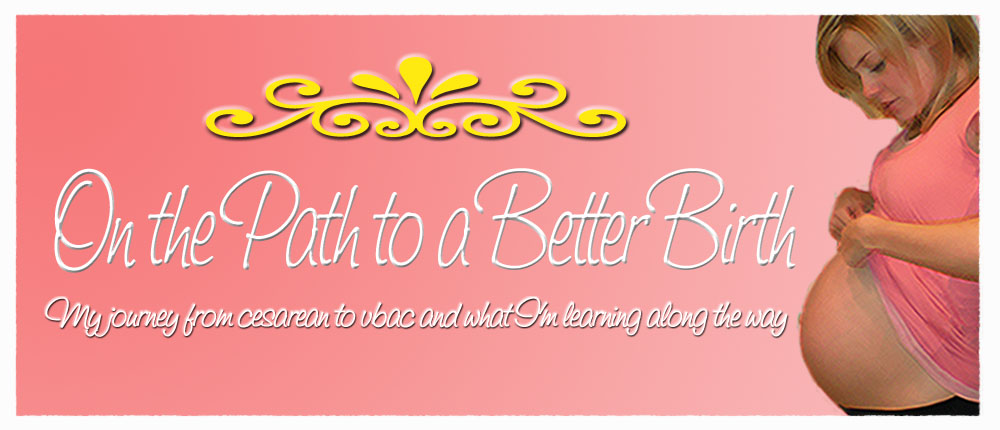
I copied this article directly from the ICAN website
FYI the percentage of cesarean sections in AZ in 2007 was 26.2%
More Women Forced into Surgery; Few Mothers Recognize They Can Reduce Their Risk of Surgery
Redondo Beach, CA, March 18, 2009 – The National Center for Health Statistics has reported that the cesarean rate hit an all-time high in 2007, with a rate of 31.8 percent, up two percent from 2006.
“Every pregnant woman in the U.S. should be alarmed by this rate,” said Pam Udy, president of the International Cesarean Awareness Network (ICAN). “Half or more of cesareans are avoidable and over-using major surgery on otherwise healthy women and babies is taking a toll.”
A major driver of cesarean overuse is underuse of vaginal birth after cesarean (VBAC). The VBAC rate currently hovers around 8 percent, far lower than the Healthy People 2010 goal of 37 percent. Driving this decline is the growing practice of hospitals banning VBAC. In February, ICAN released the results of a new survey showing a startling increase in the number of hospitals banning VBAC. The survey showed a near triple increase (174%) from November 2004, when ICAN conducted the first count of hospitals forbidding women from having a VBAC. In 2004, banning hospitals numbered 300. The latest survey, conducted in January 2009, counted 821 hospitals formally banning VBAC and 612 with “de facto” bans (1). Full results of the research can be seen at the VBAC Policy Database.
Between formal and de facto bans, women are not able to access VBAC in 50% of hospitals in the U.S. Research has consistently shown that VBAC is a reasonably safe choice for women with a prior cesarean. According to an analysis of medical research conducted by Childbirth Connection, a well-respected, independent maternity focused non-profit, in the absence of a clear medical need, VBAC is safer for mothers in the current pregnancy, and far safer for mothers and babies in future pregnancies (2). While VBAC does carry risks associated with the possibility of uterine rupture, cesarean surgery carries life-threatening risks as well.
“The choice between VBAC and elective repeat cesareans isn’t between risk versus no risk. It’s a choice between which set of risks you want to take on,” said Udy.
Studies from the National Institute of Child Health and Human Development Maternal–Fetal Medicine Units Network, one most recently published in the February 2008 issue of the Journal of Obstetrics and Gynecology, demonstrate that repeated cesareans can actually put mothers and babies at greater clinical risk than repeated VBACs (3).
In October 2008, Childbirth Connection released a report called “Evidence-Based Maternity Care: What It Is and What It Can Achieve ,” (4) showing that the state of maternity care in the U.S. is worrisome, driven largely by a failure of care providers to heed evidence-based care practices. For most women in the U.S., care practices that have been proven to make childbirth easier and safer are underused, and interventions that may increase risks to mothers and babies are routinely overused. The authors of the report point to the “perinatal paradox” of doing more, but accomplishing less.
“All pregnant women are faced with important choices in their pregnancies. It is critical for women to understand what their choices are, and learn to spot the red flags that can lead to an unnecessary or avoidable cesarean,” said Udy.
Women who are seeking information about how to avoid a cesarean, have a VBAC, or are recovering from a cesarean can visit ican-online.org for more information. In addition to more than 110 local chapters nationwide, the group hosts an active on-line discussion group that serves as a resource for mothers. For women who encounter VBAC bans, ICAN has developed a guide to help them understand their rights as patients. The resource discusses the principles of informed consent and the right of every patient to refuse an unwanted medical procedure. The guide can be found here.
About Cesareans: When a cesarean is medically necessary, it can be a lifesaving technique for both mother and baby, and worth the risks involved. Potential risks to babies from cesareans include: low birth weight, prematurity, respiratory problems, and lacerations. Potential risks to women include: hemorrhage, infection, hysterectomy, surgical mistakes, re-hospitalization, dangerous placental abnormalities in future pregnancies, unexplained stillbirth in future pregnancies and increased percentage of maternal death.
Mission statement: ICAN is a nonprofit organization whose mission is to improve maternal-child health by preventing unnecessary cesareans through education, providing support for cesarean recovery and promoting vaginal birth after cesarean. There are 94 ICAN Chapters across North America, which hold educational and support meetings for people interested in cesarean prevention and recovery.



